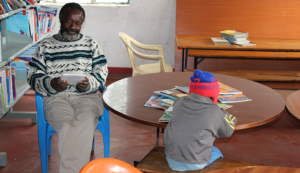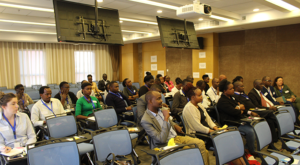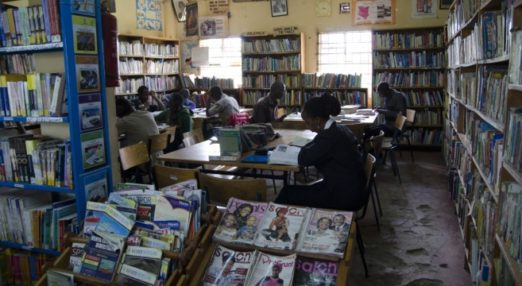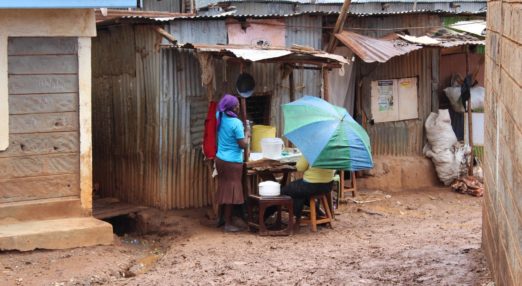Digital Life: Kenya Report 2017
This short report outlines Good Things Foundation's partnership with the Kenya National Library Service, aiming to improve the lives of people in Kenya through digital.
Starting in July 2017, our digital skills pilot programme Digital Life: Kenya set out to test Good Things Foundation’s social digital inclusion programme model and resources in a developing country, working in partnership with a network of local organisations – in this case Kenya National Library Service (knls).
We aim to help people in Kenya improve their lives through digital and evaluate how can the internet help alleviate the economic and social challenges people in Kenya face. We are testing how effective elements of the Good Things Foundation’s digital inclusion programme and resources are in supporting people to improve their lives.

10 libraries were chosen to take part in the pilot and receive face-to-face training, while 52 more libraries received training and information digitally.
It’s been an interesting journey – and one during which we’ve learned a lot – so I’m really pleased to report that Digital Life Kenya has now helped over 1000 people in Kenyan communities to gain new skills and access the digital world.
- Trained 20 librarians as Digital Champions and on Learn My Way Kenya
- Made Learn My Way, our online learning platform of free courses, available to 62 libraries across Kenya for free
- Supported over 1,000 library customers to gain basic digital skills
- Kept in touch with libraries and shared best practice and learning, via webinars with pilot libraries, newsletters and Whatsapp
- Visited 12 libraries to see how they were getting on and to tell non pilot libraries about Learn My Way.
- Set up a buddying programme linking up 12 Kenyan libraries with Online Centres in the UK and Australia, to share experiences, challenges and best practice.
- Held a Digital literacy Summit in Nairobi, co-hosted with Huawei, The Ministry of ICT and knls. There were 30 attendees from telecommunication organisations, NGOs and government, which was received very well. At the event we heard from organisations currently working on digital skills projects and discussed what basic digital skills people need for life and work. We held a workshop to explore the three main challenges to digital inclusion in Kenya, as discovered through the pilot: infrastructure, training teachers, and selling benefits of internet to people.
- Met with organisations in Kenya working in digital literacy, entrepreneurship, gender equality and government departments, and raised awareness of our work.
- Trialled data collection methods with library customers including SMS, email, Whatsapp, paper registers with the libraries, and working with a Kenyan user research organisation to collect qualitative data.
The impact
Advocacy and thought leadership
Our work in Kenya and the contacts we’ve made have allowed us to advocate the importance of digital skills. We’ve brought organisations together in Kenya to talk about digital skills and support collaborative working. There was particular interest in our digital inclusion Return On Investment calculations and the Basic Digital Skills Framework – work and tools that don’t currently exist in Kenya.
Free resource
The pilot has given librarians a curriculum, tools and resources to support library customers to learn basic digital skills and manage learner progress and activity, using Learn My Way. Management information allows them to track how they are doing, and they find it helpful to see what other libraries are doing because it encourages them to do more.

Unsupported use
Libraries in the wider network are starting to pay attention too. Knls has regional IT officers, based in a few libraries and supporting a number of libraries in their area.
James from Murang’a Library is now testing Learn My Way and how it compares to the basic computer classes he was already delivering. This is one of the few libraries that had a basic computer skills curriculum before Learn My Way. Learn My Way allows librarians to leave customers to get on with it so they can spend time working on other things.
Skills for work
A lot of people, even young people didn’t learn digital skills at school. The certificates are popular and learners are using them as evidence for jobs and college. A learner at Murang’a Library is using the skills she has learnt on Learn My Way to train people who come to the Cyber Cafe where she works.
A learner at Nanyuki – a Prison Warden, had never learnt about computers and the internet before. He spent 2 hours everyday after work to go to the library and use Learn My Way. On completion he had the skills and confidence to take an online course in criminology, which has led to a promotion at work.
Some libraries are supporting people to access eGovernment Services, and some are supporting teachers who now have to do a lot of admin online as part of their jobs, but don’t have the skills or the access. Learn My Way has taught them email, more internet skills and online safety.
Together with our partners we’ve done a lot during the first year… but it doesn’t stop here. We’re going to continue building on this year’s pilot to grow digital inclusion across Kenya – watch out for our next blog post on how what we’ve learned from this pilot is informing our future plans.
Related content
-

Digital Life: Kenya
In July 2017, Good Things Foundation launched Digital Life: Kenya, a 12 month pilot project in partnership with the Kenya National Library Service (klns).
-

Testing Digital Inclusion in Kenya
Read about our top findings from our year-long Digital Life: Kenya project, piloting the use of Learn My Way by the Kenya National Library Service.
